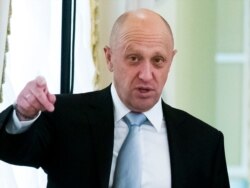Known as Russian President Vladimir Putin’s “chef” because of the billions he made in the catering business, Russian financier Yevgeniy Prigozhin had far more cooking abroad, including meddling in U.S. elections and suppressing democracy in Sudan, according to U.S. charges.
Now, U.S. President Donald Trump’s administration is issuing strong deterrents to ensure that Prigozhin and his network of offshore interests and fronts for mercenaries do not interfere in Sudan's future.
This month the U.S. Treasury Department imposed sanctions on businesses tied to Prigozhin. The Putin ally is accused of supporting former Sudanese President Omar al-Bashir and advising him to violently suppress protests. In return for this support, Sudan gave businesses linked to Prigozhin access to gold and the ores of precious metals.
U.S. Treasury Secretary Steven Mnuchin said Prigozhin has been “exploiting Sudan’s natural resources for personal gain and spreading malign influence around the globe.”
The U.S. action comes as Sudan is struggling to form a democratic government as protests are growing in intensity against the transitional government charged with reforming the legislative system and the judiciary. With Bashir jailed, U.S. officials do not want Prigozhin to serve as a conduit for Russian meddling in Sudan's future.
Prigozhin, who denies interfering in the West, Africa and Asia, finances the actions of Russia’s Internet Research Agency, a massive online troll farm accused of trying to influence elections around the world.
In Sudan, a business he controls called M-Invest is accused of spreading disinformation and advising Bashir on ways to quell protests that swept the nation in 2019.
“M-Invest is believed to have advised Omar al-Bashir on how to create a whole system of false propaganda to discredit the leaders of the popular pro-democracy protests,” said Suliman Baldo, senior adviser at The Sentry, an investigative and policy group researching money connected with war criminals.
“Then also, they advised him to stage public executions and kill a reasonable number of protesters so as to quell the protest against his regime,” Baldo said.
As payment for this support, Bashir’s regime is accused by the Treasury Department of granting gold mining concessions to Meroe Gold, a subsidiary of M-Invest.
“What Russia is doing is practicing a new form of colonialism, and they are exploiting the natural resources of Sudan. The natural heritage of the Sudanese youth who are peacefully protesting is being given away to Russians,” Jonathan Hutson, a human rights advocate in Washington, told VOA last year.
Even though Prigozhin and the businesses are outside of U.S. jurisdiction, the sanctions can still have a strong effect, analysts say.
“There is a huge reputational impact that comes with that designation by (the Office of Foreign Assets Control),” Baldo said, adding that the move will make it difficult for Pregozhin-linked businesses to operate around the world.
“This leads to the freezing of its accounts and assets that are within reach of U.S. jurisdiction, of course. But it also leads to delisting by international financial institutions and international corporations from dealing with a company that is sanctioned by the U.S. Department of Treasury,” he said.
Meroe Gold, a mining company listed in the sanctions, is still active in Sudan and has deep ties to Sudan’s security forces. Baldo believes that Sudan’s transitional government will be eager to cut ties with the entity.
“I believe that these reputational consequences will be a deterrent for the transitional pro-democracy government of Sudan today to continue the type of partnerships that Meroe Gold had with Sudanese security agencies,” Baldo said. “They will be concerned that the U.S. would again be basically unhappy about their continued cooperation with a company of such ill repute on the record in the continent of Africa.”
Baldo said the totality of charges show how Russia sought to prop up an autocratic government in Sudan while profiting from the strife.
“This is how they are linked to the anti-democracy attempts by a dictatorial regime, a genocidal regime against its own people,” he said.











